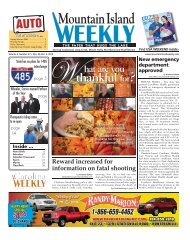Make a sweetsale - Carolina Weekly Newspapers
Make a sweetsale - Carolina Weekly Newspapers
Make a sweetsale - Carolina Weekly Newspapers
Create successful ePaper yourself
Turn your PDF publications into a flip-book with our unique Google optimized e-Paper software.
Heroin cartels<br />
(continued from page 1)<br />
manpower can cross the border.<br />
Heroin use is increasing partly because<br />
the drug is cheaper than prescription<br />
drugs such as oxycodone, known by the<br />
brand name OxyContin. A small balloon<br />
of heroin costs an average of $10, and one<br />
OxyContin pill costs $20 to $25. Users<br />
also are mixing heroin with prescription<br />
drugs, ranging from valium to Ambien, a<br />
prescription sedative. Over the past year,<br />
Charlotte EMS has responded to 1,453<br />
overdoses resulting from these types of<br />
drug cocktails.<br />
“These are huge increases in such a<br />
short period of time,” Charlotte Mayor<br />
Pat McCrory said. “These overdoses are<br />
Charlotte-Mecklenburg Police Department<br />
has mapped several heroin distribution areas<br />
in south Charlotte.<br />
occurring across the city. We’re seeing<br />
people of all races, all income levels,”<br />
he said. “We have worked hard to build<br />
a beautiful city and we simply cannot let<br />
Legal and financial roadblocks could<br />
stall an expanded drug-testing program<br />
for Mecklenburg County Jail inmates.<br />
During an Oct. 20 press conference,<br />
Charlotte-Mecklenburg Police Chief Rodney<br />
Monroe suggested drug-testing all<br />
inmates as they’re processed after arrest,<br />
in part to address a local explosion in heroin<br />
trade and use. “We want an ongoing,<br />
day-to-day testing of individuals that have<br />
been arrested,” Monroe said. “We’re still<br />
gingerly working through that process.”<br />
The number of heroin-related deaths<br />
in Charlotte has tripled since last year,<br />
as Mexican cartels target the Queen City<br />
with the drug. Ten people have died from<br />
heroin overdoses in Charlotte in 2009,<br />
compared with three in 2008. And so far<br />
this year, Charlotte-Mecklenburg police<br />
have seized 4,989 grams of heroin, up<br />
from 1,075 grams throughout last year.<br />
“We need to really draw a better correlation<br />
between drug use and crime,”<br />
Monroe said. “People that are coming in,<br />
testing positive for heroin, what are they<br />
being arrested for? Where are they being<br />
arrested?”<br />
drug use set us back.”<br />
During an Oct. 20 press conference,<br />
McCrory mentioned heroin is a citywide<br />
problem spanning from The Arboretum<br />
Community<br />
Mandatory inmate drug-testing faces hurdles<br />
Challenges could stall drug use-tracking program<br />
Tracking those statistics would give<br />
police a better idea of which drugs are<br />
involved in which crimes, Monroe said.<br />
It also would help determine the kinds of<br />
drugs used in Charlotte.<br />
How the program would be funded or<br />
staffed is unclear, however. There’s no<br />
money available from the city or county<br />
to run the tests or hire more officers.<br />
There also are legal questions about the<br />
program. No North <strong>Carolina</strong> county ever<br />
has run anything but a voluntary drugtesting<br />
program.<br />
“State law is kind of wishy-washy on<br />
this,” said Jamie Markham, a criminal law<br />
expert at the University of North <strong>Carolina</strong><br />
School of Government.<br />
“The department of corrections can virtually<br />
test anyone once they’re in prison (but)<br />
it’s different on a local level,” Markham<br />
said. “Cheek swabs, stuff like that, which<br />
are minor intrusions, you can get away<br />
with, but I’m not sure if mandatory drugtesting<br />
would violate the inmate’s rights.”<br />
Securing a judge’s approval could be<br />
problematic because the program would<br />
establish precedent, Markham said. “If<br />
to Northlake Mall. However, CMPD confirmed<br />
there are no statistics or cases pegging<br />
The Arboretum or Northlake Mall as<br />
specific problem areas at this time. q<br />
it’s just being used for the study – if it’s<br />
not being tied in to officer safety or safety<br />
within the jail – I’m not sure a judge would<br />
sign off on it,” he said.<br />
Mecklenburg County currently operates<br />
a program called A.D.A.M., Arrestee Drug<br />
Abuse Monitoring, run by UNC Charlotte<br />
professor Paul Friday. Inmates willingly<br />
enter the program, then are tested at random<br />
intervals. It costs $100,000 a year to<br />
run and is funded with federal grants.<br />
Mandatory drug-testing would also be<br />
a big undertaking for the Mecklenburg<br />
County Sheriff’s Department. “(Day-today<br />
testing) would be a huge thing for us<br />
to tackle,” Sheriff’s Department Public<br />
Information Officer Julia Rush said, adding<br />
that more than 50,000 people a year<br />
are currently processed at the jail.<br />
“What the sheriff wants to do is sit down<br />
and see how the stats could be used,” Rush<br />
said. “We may already have the program in<br />
place to do what everyone wants.” Before<br />
an expansion is considered, Rush said, the<br />
sheriff would want to ensure funding is in<br />
place for the drug-testing program and the<br />
officers needed to run it. q<br />
H1N1<br />
(continued from page 3)<br />
Information Officer Rick Christenbury<br />
said. “We were told the (full) order would<br />
be here Oct. 1, then we were told Oct. 15,<br />
then Oct. 30. We’re doing the best with<br />
what we have.”<br />
Presbyterian Healthcare, meanwhile,<br />
has received about 1 percent of the<br />
400,000 doses it ordered, said Presbyterian<br />
Hospital public relations manager<br />
Marcia Meredith. She said the vaccines<br />
were distributed to affiliated medical<br />
South Charlotte Catholic church<br />
changes procedures for H1N1<br />
practices and the system’s hospitals: Presbyterian<br />
Hospital, 200 Hawthorne Lane;<br />
Presbyterian Orthopaedic Hospital, 1901<br />
Randolph Road; Presbyterian Hospital<br />
Matthews, 1500 Matthews Township<br />
Parkway; and Presbyterian Hospital Huntersville,<br />
10030 Gilead Road. Presbyterian<br />
Children’s Hospital, located on the second<br />
floor of Presbyterian Hospital, received<br />
most of that facility’s supply. At other locations,<br />
most doses were given to children<br />
and pregnant women, considered at-risk<br />
populations.<br />
A spokesman for <strong>Carolina</strong>s HealthCare<br />
said the company still is trying to determine<br />
how much of the vaccine its facilities<br />
have. <strong>Carolina</strong>s HealthCare hospitals<br />
can order doses themselves, making it<br />
more difficult to get totals from each of<br />
its 200 facilities.<br />
by Regan White<br />
regan@thecharlotteweekly.com<br />
On Oct. 27, the Rev. Msgr. John<br />
McSweeney of St. Matthew Catholic<br />
Church, 8015 Ballantyne Commons<br />
Parkway, sent an e-mail to the south<br />
Charlotte church’s more than 27,000<br />
parishioners explaining the church<br />
will take precautions and make procedural<br />
changes to protect churchgoers in<br />
response to the H1N1 state of emergency<br />
declared Oct. 26 by President Obama.<br />
Only the Eucharistic wafer will be<br />
offered at Communion, meaning no<br />
more communal drinking at the wine<br />
chalices. “Effective immediately, we will<br />
offer only one species, the body of Christ,<br />
at all daily and weekend liturgies until<br />
further notice. No cup will be offered,”<br />
the statement read. McSweeney recommends<br />
that parishioners receive<br />
the Eucharist in their hands, although<br />
church members who still wish to<br />
receive the consecrated wafers on their<br />
tongues can’t be denied. In addition, a<br />
public sign of peace – shaking hands and<br />
saying “Peace be with you” – will be suspended,<br />
as will holding hands during the<br />
Lord’s Prayer.<br />
McSweeney also continued to ask<br />
that people sick with the flu or flulike<br />
illnesses refrain from attending Mass to<br />
prevent spread of the virus.<br />
The same changes have been made<br />
at Catholic churches across the country<br />
since H1N1 flu first began circulating<br />
last spring. St. Matthew Catholic’s<br />
Facilities Operations Director Antoinette<br />
Usher said Oct. 27 that the move<br />
to make the changes at St. Matthew<br />
was McSweeney’s decision, not a directive<br />
from the Diocese of Charlotte.<br />
McSweeney has been very proactive on<br />
behalf of the parish since H1N1 first<br />
broke out last spring, Usher added. “We<br />
probably have the largest supply of hand<br />
sanitizer in the south Charlotte area –<br />
both alcohol- and non-alcohol-based<br />
sanitizer,” she said, adding that since<br />
the spring McSweeney has stressed the<br />
importance of not shaking hands or coming<br />
to church when feeling sick.<br />
“We’re right under 8,000 families so<br />
that translates to well over 27,000 folks,”<br />
Usher said. “With our kids in the parish,<br />
they’re in more than 139 different educational<br />
institutions. As you can understand,<br />
Monsignor has to respond to a<br />
very real need.” q<br />
Manufacturing delays to blame<br />
The Centers for Disease Control and<br />
Prevention announced Oct. 23 that the<br />
number of doses expected to be shipped<br />
that month dropped from 40 million to<br />
30 million doses at most. Of that amount,<br />
11.3 million doses had been distributed<br />
nationwide. Another 16 million were<br />
expected to ship on Oct. 30; of that shipment,<br />
Mecklenburg will get 200 doses.<br />
During an Oct. 23 conference call,<br />
CDC Director Thomas Frieden blamed<br />
manufacturing delays. “It’s frustrating to<br />
all of us,” he said. “Manufacturers are<br />
working hard to get as much vaccine out<br />
as safely as possible. …<br />
“This is not unusual for influenza,” Frieden<br />
said. “It’s a chicken-and-egg process.<br />
It doesn’t move as quickly or as efficiently<br />
as we’d like, and it’s not as predictable.” q<br />
www.thecharlotteweekly.com<br />
South Charlotte <strong>Weekly</strong> • Oct. 30-Nov. 5, 2009 • Page 11

















